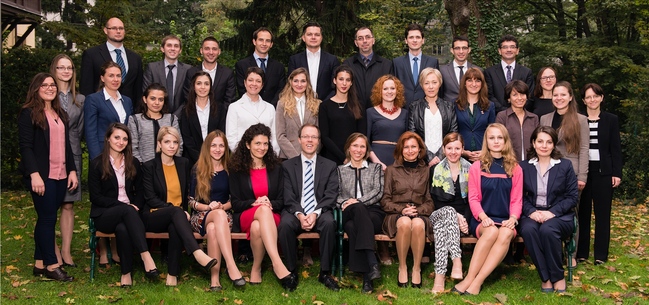- English | Русский

In cooperation with the European Central Bank (ECB), the Oesterreichische Nationalbank (OeNB) held its annual seminar on “Macro-Financial Stability in Central, Eastern and Southeastern Europe” on October 13–17, 2014, at the Joint Vienna Institute (JVI).
The OeNB Foreign Research Division has organized the one-week course since 2012. It addresses economic policy questions confronting Central, Eastern and Southeastern European (CESEE) countries in a challenging domestic and global environment; it emphasizes the macro-financial stability issues that are of most concern to central bankers. The program is designed to help participants better understand the interactions between the real economy and the financial sector, the related role of fiscal policy, and how to assess financial stability risks in the region.
For the first three days of the course, lectures provide analytical background, discussing surveillance tools that the OeNB and international institutions use. Contributing are not only OeNB staff economists, but also lecturers from institutions like the ECB, the European Commission, the EBRD, Banque de France, selected CESEE central banks, and the Slovak Council for Budget Responsibility. The lectures covered cross-border banking issues, capital and housing market developments, fiscal adjustment experiences, practical assessment of balance-of-payment and exchange rate risks, evaluation of systemic financial sector risks, and models used for stress testing, economic forecasting and the examination of cross-country spillovers.
The last two days of the seminar, which build on the analytical tools presented in the lectures, are devoted to the group work that is a vital element of the course. This year’s group work was designed as Troika negotiations, in which participants took on roles as country officials, such as minister of finance or central bank governor, and international authorities, such as representatives of the European Commission, the ECB, or the International Monetary Fund (IMF). The groups were asked in three rounds of negotiations to draw up an adjustment program supported by the necessary policy measures for three countries suffering from macro-financial stress. The participants benefited considerably from detailed feedback at various stages of the negotiation from the ECB representative, who was involved in the actual Troika negotiations with Cyprus.
Attending the course were 30 experts and mid-level officials from CESEE countries’ central banks and ministries of finance, economy, and European integration. The seminar feedback was highly positive and participants appreciated the analytically oriented lectures as well as the group work.
This year’s seminar is scheduled for September 14–18, 2015; the application deadline is July 12, 2015. If you are interested in attending this course, <link http: www.jvi.org training _blank>click here to view the course description and apply online.
Markus Eller, Economist, OeNB
Krisztina Jäger-Gyovai, Economist, OeNB